 Petzlover
Petzlover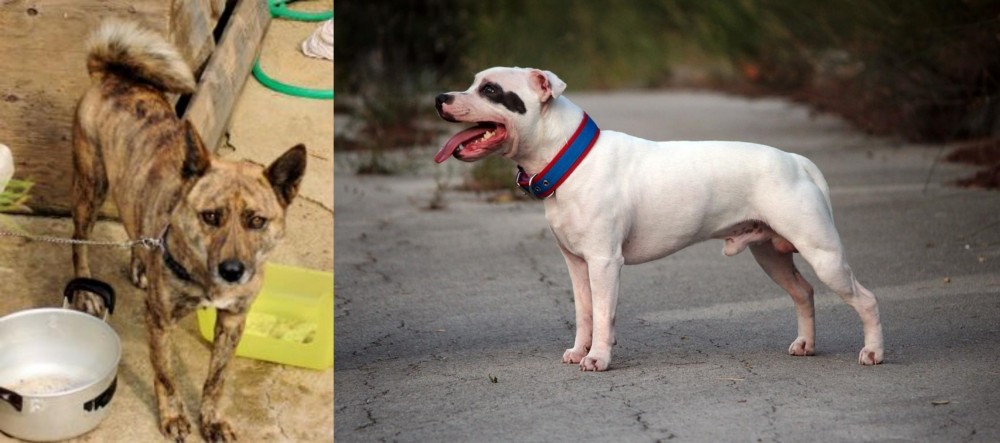 Ryukyu Inu is originated from Japan but Staffordshire Bull Terrier is originated from United Kingdom. Ryukyu Inu may grow 9 cm / 4 inches higher than Staffordshire Bull Terrier. Ryukyu Inu may weigh 8 kg / 18 pounds more than Staffordshire Bull Terrier. Ryukyu Inu may live 3 years less than Staffordshire Bull Terrier. Both Ryukyu Inu and Staffordshire Bull Terrier has almost same litter size. Both Ryukyu Inu and Staffordshire Bull Terrier requires Low Maintenance.
Ryukyu Inu is originated from Japan but Staffordshire Bull Terrier is originated from United Kingdom. Ryukyu Inu may grow 9 cm / 4 inches higher than Staffordshire Bull Terrier. Ryukyu Inu may weigh 8 kg / 18 pounds more than Staffordshire Bull Terrier. Ryukyu Inu may live 3 years less than Staffordshire Bull Terrier. Both Ryukyu Inu and Staffordshire Bull Terrier has almost same litter size. Both Ryukyu Inu and Staffordshire Bull Terrier requires Low Maintenance.
 The Ryukyu Inu is a medium-sized dog that comes from Okinawa, Japan.
The Ryukyu Inu is a medium-sized dog that comes from Okinawa, Japan.
It’s a dog that is fairly rare having been used to track boar. There isn’t much information on the dog’s history but after its numbers declined after World War II, there was an urge in the 1980s to save the breed.
The dog isn’t recognized by any major Kennel Clubs.
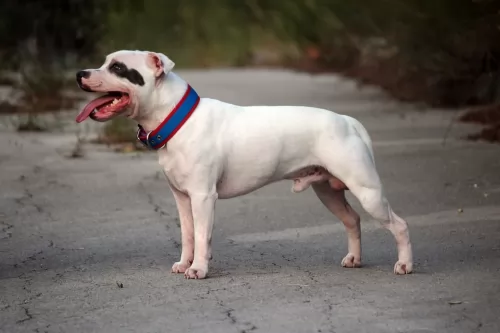 The Staffordshire Bull Terrier was first developed in the northern sections of Birmingham and in Staffordshire, England. The Staffie is a cross between a Black and Tan Terrie and the Bulldog, but had other breeds crossed in over time in order to create a bull-baiting dog and a fighting dog. In the Victorian age these sports were banned but dog fighting went underground and continues on some level today.
The Staffordshire Bull Terrier was first developed in the northern sections of Birmingham and in Staffordshire, England. The Staffie is a cross between a Black and Tan Terrie and the Bulldog, but had other breeds crossed in over time in order to create a bull-baiting dog and a fighting dog. In the Victorian age these sports were banned but dog fighting went underground and continues on some level today.
The Staffordshire Bull Terrier was exceptional at these “sports” due to his build, power and jaw strength. Today’s Staffie is a descendent of those early Bull Terrier crosses. Together with the Bull Terrier and the American Pit Bull, the Staffie also traces its roots back to those original English Bully dogs. All three breeds have the Bulldog in common.
After dog fighting and bull baiting were banned the Stafforshire Bull Terrier was further developed as a companion and pet. Still their reputation as fighting dogs cost them recognition in the official kennel clubs for some time. They finally made the UK registry in 1935, but it was not until 1974 that the American Kennel Club (AKC) accepted them.
 Japanese dog breeds end with the word ‘Inu’ or ‘Ken’ . It means ‘dog’.
Japanese dog breeds end with the word ‘Inu’ or ‘Ken’ . It means ‘dog’.
The medium sized Ryukyu Inu stands at between 46 to 50cm in height and weighs between 15 to 25kg. He has a black nose, dark brown eyes and erect ears. The tail is long and curls over the back.
The dog’s coat is short and you get the single- and double coated varieties. The coat can be brindle, red, white, liver or black. Some of the dogs have tiger-like stripes in the coat. People are amazed at these dogs as they have incredible climbing abilities and are even capable of climbing a tree.
These dogs are quiet, unobtrusive dogs. The Ryukyu Inu looks very much like a wild dog, which gives the impression of being un-trainable and ferocious but they are easily trained and make splendid pets.
Many people who have had them as pets say they would choose this dog over and over again. They are brave too and get on well with children or pets in the home. They don’t look for trouble, and their kind, stable natures make them excellent therapy dogs.
They’re intelligent dogs and will require plenty of mental and physical stimulation. They will also need to be trained and socialized as they are confident, strong-willed dogs who might not obey you if left to do what they want.
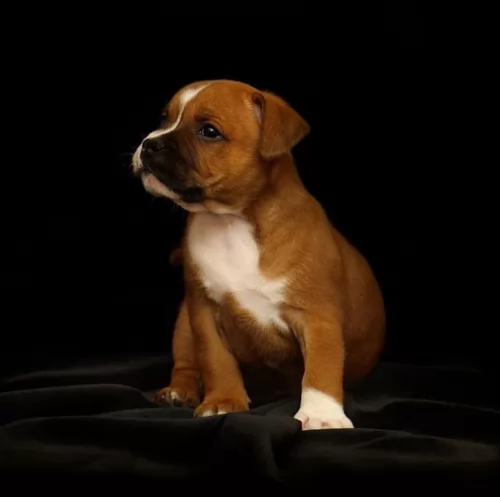 The Staffordshire is a muscular, stocky and unusually strong breed, small to medium size in height and build. They have broad, powerful chests, wide set, strong legs, strong shoulders, broad head with a fairly short muzzle. Their ears are not cropped but they are short and fold over. The coat is stiff, close and short and the tail is medium and carried low. Most Staffies are brown, but they can be red, brindle with white, fawn, black, white or blue.
The Staffordshire is a muscular, stocky and unusually strong breed, small to medium size in height and build. They have broad, powerful chests, wide set, strong legs, strong shoulders, broad head with a fairly short muzzle. Their ears are not cropped but they are short and fold over. The coat is stiff, close and short and the tail is medium and carried low. Most Staffies are brown, but they can be red, brindle with white, fawn, black, white or blue.
 This dog has always been a hunting dog so he will want to have his fair share of good exercise – long walks as well as ball and rope games.
This dog has always been a hunting dog so he will want to have his fair share of good exercise – long walks as well as ball and rope games.
He makes a splendid pet because he has an amicable nature wanting to please. He is quiet, loving and loyal, and with such a dog in your home and heart, you just keep discovering what a wonderful pet this 4-legged friend can be.
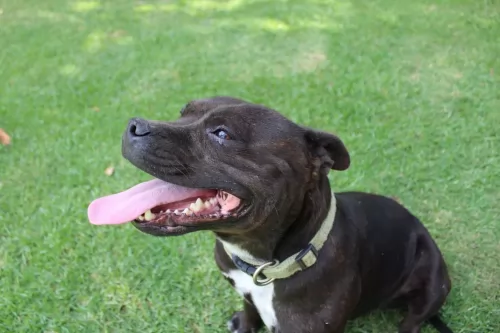 1.Children friendliness The breed adores children but care should still be taken because they are so strong and their jaws are so powerful.
1.Children friendliness The breed adores children but care should still be taken because they are so strong and their jaws are so powerful.
2.Special talents they adore children and they one of the most powerful jaws among canines.
 These Japanese dogs are thought to be fairly healthy dogs, but like with most other dogs, you would need to be aware of hip dysplasia, bloat, caner and hypothyroidism.
These Japanese dogs are thought to be fairly healthy dogs, but like with most other dogs, you would need to be aware of hip dysplasia, bloat, caner and hypothyroidism.
The Ryukyu Inu, with its 10 to 12 years lifespan, will be prone to minor ailments, but with good care he is not likely to succumb to any of them.
Cataracts have a number of causes in dogs. This disease of the eye can occur at any age, and can develop over weeks or even years.
Cataracts can occur in just one eye or both eyes and a disease such as diabetes can bring on a cataract.
Good nutrition is important for a dog to build a strong immune system, and nutritional supplementation can certainly help to enhance lens health. Cataract surgery can be performed to remove the cataracts.
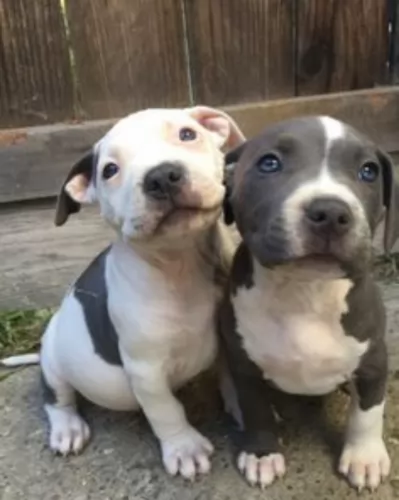 • Patella luxation otherwise known as a slipped kneecap- can cause pain and some lameness.
• Patella luxation otherwise known as a slipped kneecap- can cause pain and some lameness.
• Skin allergies and even a tendency toward Mange which is chronic in some forms and fatal in others.
• Like most active dogs their size, they are susceptible to bloat which can be fatal if not treated immediately.
 The coat of the Ryukya Inu requires brushing twice a week to remove loose hairs. At the same time check your dog over for new lumps and check inside his mouth for bad teeth. Bad teeth can cause lots of pain and toxins within the body. You can also choose to have the teeth seen to and cleaned by your vet.
The coat of the Ryukya Inu requires brushing twice a week to remove loose hairs. At the same time check your dog over for new lumps and check inside his mouth for bad teeth. Bad teeth can cause lots of pain and toxins within the body. You can also choose to have the teeth seen to and cleaned by your vet.
Provide him with his own warm, dry place to sleep.
Provide him with top quality food. There are some excellent commercially manufactured foods on the market that make a point of ensuring good ingredients in them. Your Ryukya Inu needs good food to ensure longevity and health.
Try to include some home-made food for him which can be simply mixed into the dry kibble twice a week. Boiled chicken, brown rice or pasta and spinach, sweet potatoes and carrots is super tasty and nutritious. This food can all be chopped up, refrigerated and added warmed up and in small portions to your pets dry kibble once or twice a week. Your dog will love it.
Ensure there is always a bowl of fresh, cool water within his reach.
Have him neutered or spayed if you aren’t wanting puppies.
Keep his vaccines up to date against some deadly canine diseases.
Get him to the vet when he is injured, in pain or sick.
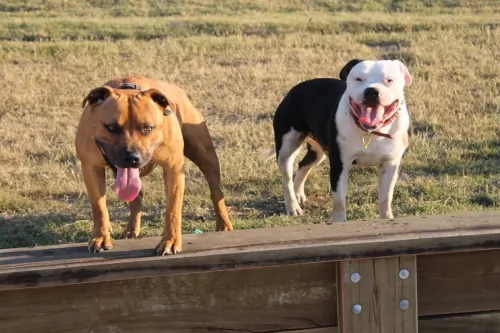 1.Feeding the puppy Don’t over feed as he grows fast. Feed a high quality dog food for medium size puppies. Feed 1-2 and a quarter cups in 3-4 meals per day.
1.Feeding the puppy Don’t over feed as he grows fast. Feed a high quality dog food for medium size puppies. Feed 1-2 and a quarter cups in 3-4 meals per day.
2.Feeding the adult Don’t exercise right before or after eating due to potential for bloat. Feed 1-2 times a day a high quality medium breed dog food.
4. Games and Exercises They are terriers after all and they dig. Need a fairly large yard with a strong fence. They love to play ball, frisbee and can excel at cart pulling.